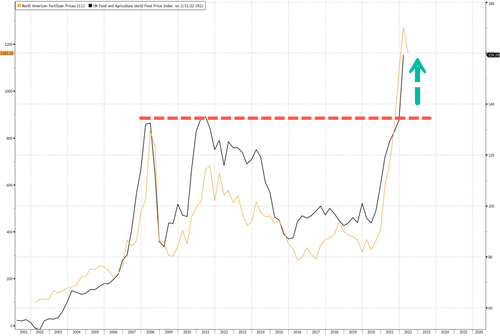Brazil’s Top Farmer To Slash Fertilizer Usage By 25% Amid Shortage
Soaring prices for industrial fertilizer have forced one of Brazil’s largest farmers to initiate plans to reduce nutrient spreading on fields by at least a quarter in 2022-23, according to Bloomberg.
SLC Agricola SA, which manages soybeans, corn, and cotton fields in an area larger than the state of Delaware, will reduce the use of fertilizer by 20% and 25%, Chief Executive Officer Aurelio Pavinato said.
Pavinato’s planned reduction of fertilizer comes as prices have soared to record highs due to shortages stemming from the Russian invasion of Ukraine. He said fewer nutrients won’t necessarily affect crop production yet.
“It’s possible to cut fertilizers in a year and have a null impact on production,” he said in an interview, adding there are fertilizer reserves in the soil from previous seasons.
SLC’s decision to reduce fertilizer on fields is a prime example of how farmers worldwide are coping with high prices and shortages. Some farmers are switching to crops that need less fertilizer.
Even though Pavinato doesn’t think harvests will be affected in the near term. The prospect of lower yields is a significant concern among ag traders and continues to push global food prices to record highs.
CBoT trader Tommy Grisafi (also risk advisor at commodity trading firm Advance Trading Inc.) said, “fertilizer supply issues will remain a problem for a few years and will soon result in declining yield production of crops in some of the world’s top growing regions.”
Grisafi warned: “It’s not if, it’s when.”
The news from Brazil is very alarming because 80% of the country’s farmland is very reliant on fertilizers, and more than 85% of its fertilizer is imported from abroad (susceptible to disruptions).
Brazil is also a top ag exporter of coffee, sugar, soybeans, manioc, rice, maize, cotton, edible beans, and wheat. If future harvests decline because of less fertilizer usage, this could then exacerbate the global food crisis that the Rockefeller Foundation expects to hit “in the next six months.”
It might be a perfect time to plant a garden and become more independent as cracks in the global food supply chain emerge.
Tyler Durden
Fri, 04/29/2022 – 15:30
via ZeroHedge News https://ift.tt/QC52boJ Tyler Durden
